AI in Game Development: Transforming How Games Are Created
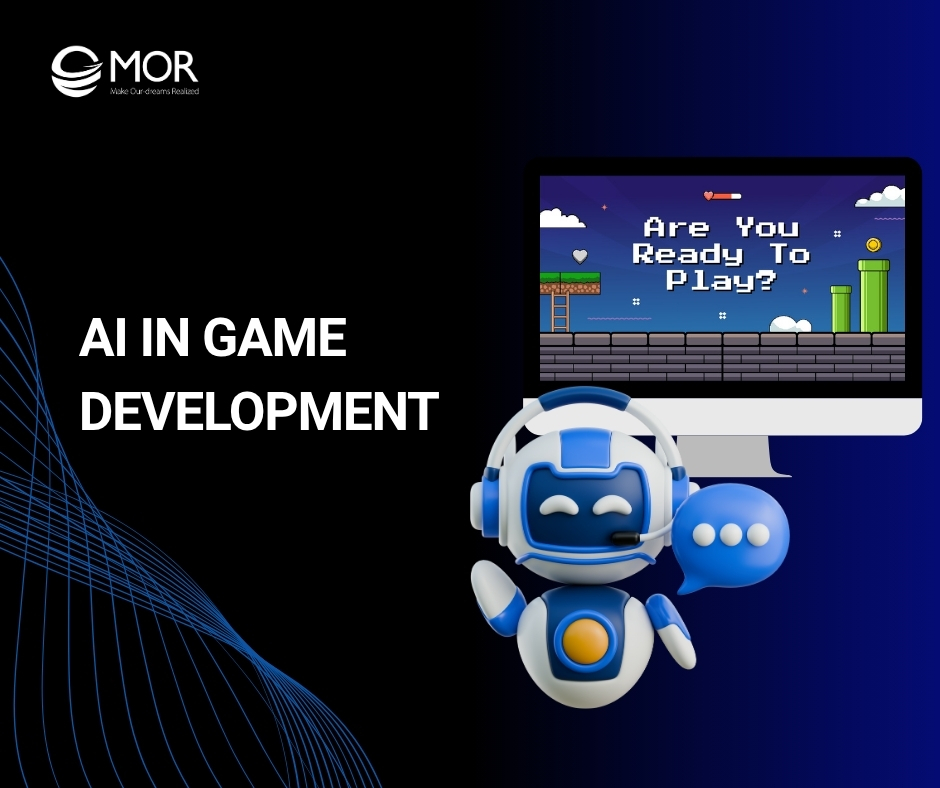
AI in game development is reshaping how studios build, design, and deliver gaming experiences. It helps create smarter characters, adaptive worlds, and lifelike stories that react to every player’s move. This MOR Software’s guide will show how artificial intelligence is changing the way games are made, from design innovation to real-world applications shaping the industry’s future.
What Is AI In Game Development?
AI in game development is the use of artificial intelligence to design, improve, and refine video games. It involves both the game creation process and the behavior of intelligent systems inside the game. During production, developers use tools powered by artificial intelligence in game development to create realistic player behavior, generate dialogue, and build new levels or concept art. These systems make it easier for teams to save time and focus on storytelling, creativity, and unique gameplay ideas while automated tools handle repetitive work.
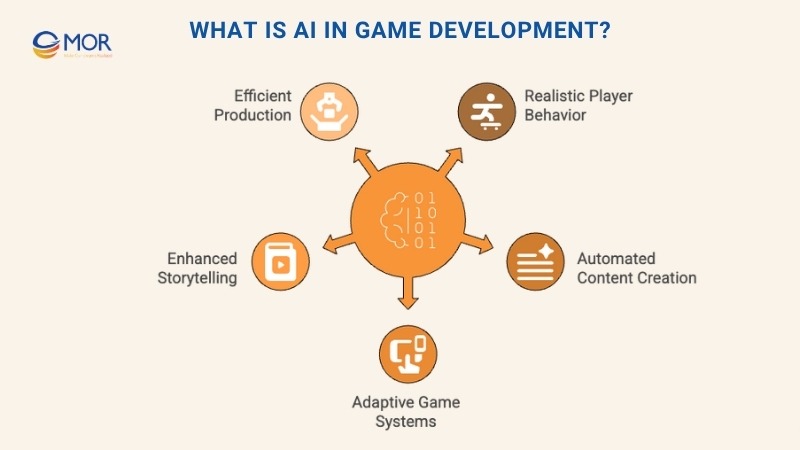
What Is AI In Game Development?
Today, AI in video game development has become a core part of how studios deliver engaging and lifelike experiences. It allows games to learn from players, change difficulty levels, and create dynamic responses that make every session feel unique.
AI Technology | Description | Application in Games |
| Dynamic AI / Adaptive AI | Systems that respond to player actions in real time. | Adjusts gameplay, NPC behavior, and difficulty levels to keep players engaged. |
| Reinforcement Learning (RL) | AI improves decisions through rewards or penalties. | NPCs modify strategies, such as combat moves or puzzle hints, based on player behavior. |
| Procedural Content Generation (PCG) | Creates new levels, maps, or objects using set rules. | Builds fresh environments and challenges to keep gameplay interesting. |
| Behavioral Modeling | Uses data to predict what players might do next. | Makes NPC reactions and interactions more natural and human-like. |
| Natural Language Processing (NLP) | Understands and responds to human speech or text. | Enables dynamic conversations and storylines that react to player choices. |
Non-player characters (NPCs) are computer-controlled entities guided by the game’s AI systems rather than by players.
This blend of creativity and technology shows how the use of AI in game development continues to shape modern gaming experiences and push interactive storytelling to new heights.
Core Types Of AI Used In Game Development
Several major technologies drive AI in game development, shaping how characters act and worlds evolve in real time. Each plays a distinct role in making gameplay more believable and engaging.
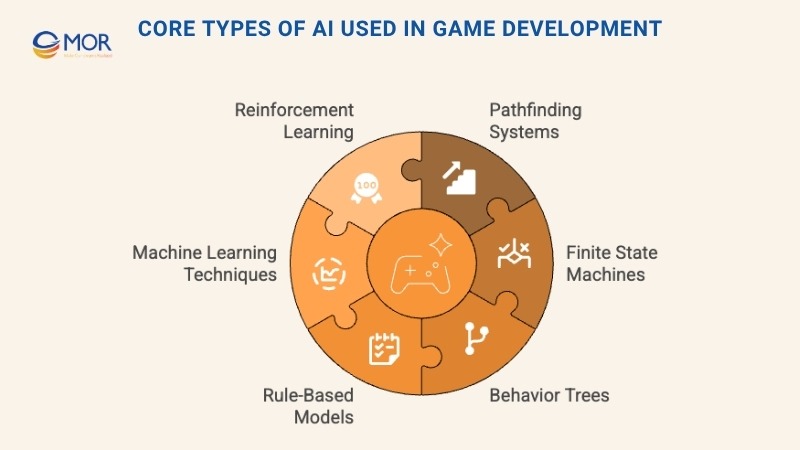
Core Types Of AI Used In Game Development
- Pathfinding Systems: These help NPCs figure out where to move and how to reach their goals. Instead of walking along fixed routes, they can avoid walls, obstacles, or dangerous areas, just like human players do. This makes navigation smoother and more natural within the game world.
- Finite State Machines (FSM): This structure helps characters switch between behaviors. A guard, for example, might patrol calmly, then chase a player when spotted, or search nearby areas when the player hides. FSMs make these transitions logical and lifelike.
- Behavior Trees: These models define a list of conditions and actions that control how NPCs respond to their surroundings. A villager might wave when approached, rest when tired, or enter a house at night. This system keeps virtual characters active and believable, even when players are not interacting with them.
- Rule-Based Models: This logic ensures consistent behavior in every scenario. NPCs follow clear rules so their actions make sense. They won’t walk away in the middle of a chat or act randomly because the rules guide each decision.
- Machine Learning Techniques: This form of game dev AI lets NPCs adapt to player behavior. It studies how players act and adjusts difficulty or tactics to keep every encounter fresh. If a player repeats the same move, NPCs will quickly learn new ways to counter it.
- Reinforcement Learning: This model helps NPCs learn from their successes and mistakes. If one approach fails, they test another until they achieve better outcomes. It keeps gameplay unpredictable and realistic over time.
These systems highlight how the use of AI in game development improves decision-making, creativity, and interaction quality across every layer of a game’s design.
Main Benefits Of AI In Game Development
AI in game development helps studios simplify complex workflows and save valuable time. It automates many repetitive steps such as creating game environments, smoothing animations, testing gameplay, detecting bugs, scripting NPC behavior, and balancing mechanics. These improvements help developers focus more on creativity and storytelling instead of routine technical work.
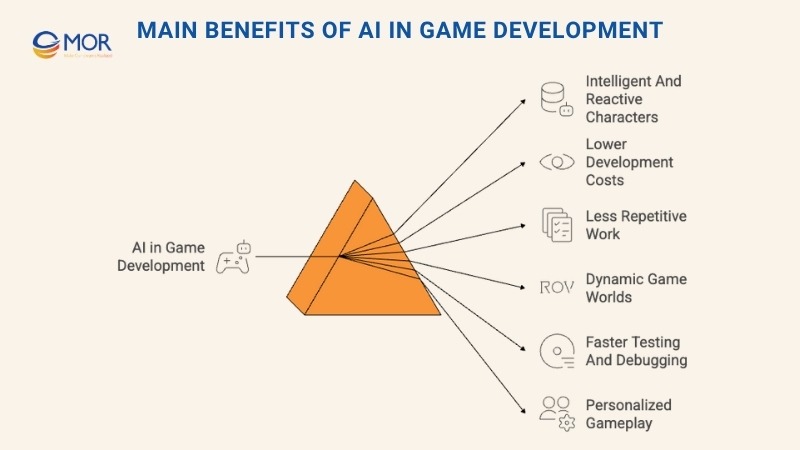
Main Benefits Of AI In Game Development
1. Intelligent And Reactive Characters
Modern AI systems create smarter, more adaptive characters that respond naturally to player actions. Developers can use AI game design engines to build NPCs that learn, react, and evolve during gameplay. These intelligent responses, combined with realistic dialogue systems, help games feel more alive and interactive. Every encounter becomes unique, making players more engaged in the story.
2. Lower Development Costs
The use of automation in AI in game development reduces both time and cost. It handles large-scale tasks such as content generation, bug fixing, and performance testing. This means studios can cut back on manual labor, shorten production cycles, and use those resources to improve creativity, gameplay depth, or marketing reach. As a result, artificial intelligence for games helps developers create higher-quality products without expanding budgets.
3. Less Repetitive Work
AI now takes care of many time-consuming tasks such as asset creation, NPC scripting, and automated test runs. These tools streamline production and free up your team to focus on creativity, storylines, and player experience. With this support, the overall workflow becomes faster, more consistent, and less dependent on manual input.
4. Dynamic Game Worlds
Modern game making AI allows developers to create living, ever-changing environments. Using generative tools, it can build terrains, adjust lighting, or simulate weather systems that shift with each playthrough. This keeps every session feeling fresh and unpredictable for players. The ability to generate and modify worlds instantly shows how AI-based development brings creativity and scalability together in one powerful approach.
5. Faster Testing And Debugging
AI has made quality assurance in games much quicker and more precise. It can simulate thousands of gameplay situations to spot bugs, glitches, and balance problems before release. This automation improves overall testing accuracy, shortens review cycles, and ensures the final product feels smooth and ready for players. With AI-powered game creation, studios can release polished titles faster and maintain consistent quality across updates.
6. Personalized Gameplay
AI systems study player actions to adjust stories, levels, or difficulty in real time. This creates experiences that feel tailored to each individual’s play style. Through adaptive learning, AI in game development helps every player face challenges that fit their skill level while keeping engagement high. Over time, it shapes games that feel more personal and encourages players to return again and again.
Real-World Use Cases Of AI In Game Development
The impact of AI in game development goes far beyond automation. It now serves as a creative partner that helps developers build smarter worlds, realistic characters, and interactive stories. This technology blends human imagination with intelligent algorithms to deliver games that evolve naturally and respond to every player’s actions. With this shift, the industry has entered an era where gameplay feels more dynamic and emotionally engaging.
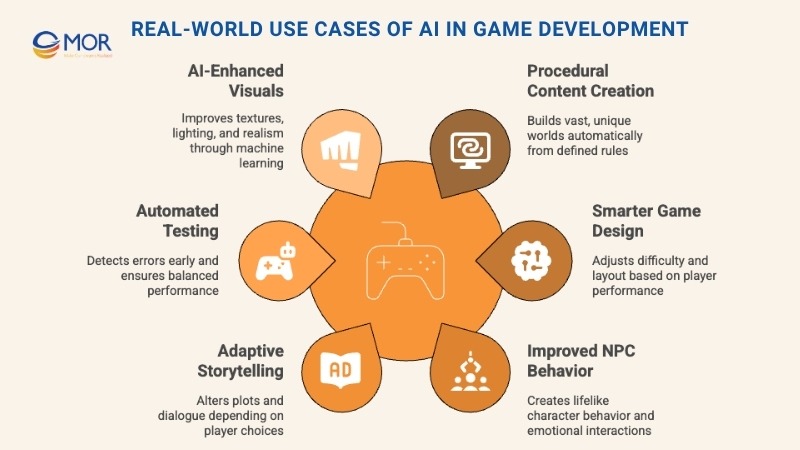
Real-World Use Cases Of AI In Game Development
1. Procedural Content Creation
AI used in game development has redefined how worlds are built. Instead of designing every object manually, developers use intelligent tools to generate landscapes, characters, and levels automatically. The results are massive, ever-changing environments that feel new each time players enter the game. This process saves development time while increasing variety and creativity.
In AI in game development, procedural systems don’t just produce random results. They create consistent and believable worlds that react to players’ progress. This approach allows teams to deliver scale and complexity impossible through manual work alone.
A great example is No Man’s Sky, a game powered by AI algorithms that produce an entire universe of planets with distinct ecosystems and weather. The developers at Hello Games used procedural generation to build over 18 quintillion planets, each with unique terrain and life forms. This limitless diversity shows how game making AI can push creativity and scale beyond human limits.
2. Smarter Game Design With AI Algorithms
Modern AI in game development is reshaping how designers build engaging and adaptive gameplay. With advanced algorithms, developers can study player actions and fine-tune environments or challenges in real time. This allows each playthrough to feel unique and personal, turning every session into a tailored experience.
AI tools now assist in crafting levels, suggesting layout changes, and optimizing player flow to keep engagement high. Instead of handling repetitive adjustments, designers can focus on creativity while AI game design systems handle balance and pacing. The result is a smoother, smarter process that produces games that react naturally to player skill and decisions.
A great showcase of this concept is Middle-earth: Shadow of Mordor with its famous Nemesis System. The AI tracks every player encounter and evolves enemies based on those interactions. Rivals remember past battles, grow stronger, and develop their own personalities. This approach makes each journey unpredictable and deeply immersive, proving how AI technology in gaming can turn traditional design into something far more responsive and alive.
3. Improved NPC Behavior And Interaction
Recent advances in AI in game development have transformed how non-playable characters behave and interact with players. Instead of repeating simple patterns, NPCs now react intelligently to different situations. They can learn from previous encounters, adjust their tactics, and respond in more human-like ways. This evolution creates richer stories and deeper emotional connections between players and the world around them.
In AI in video game development, characters no longer just follow scripts. They understand context, recognize danger, and make choices that shape the outcome of a scene. These realistic responses turn standard interactions into memorable moments that enhance gameplay.
A strong example is The Last of Us Part II, where AI improves both enemy and ally behaviors. NPCs communicate with each other, use teamwork, and even call out names during combat. This level of awareness makes every encounter feel alive, showing how this technology can bring emotion, intelligence, and realism into digital worlds.
4. Adaptive Storytelling Systems
AI has introduced a new level of creativity in storytelling, turning static plots into living narratives that change with every decision. Through AI in game development, stories now adapt dynamically to player choices, creating different outcomes, relationships, and emotional arcs. Each action affects how events unfold, giving players a sense of control and personal connection to the story.
These systems analyze player decisions to adjust dialogue, plot direction, and even character behavior in real time. The result is a unique and emotionally engaging journey for every individual.
A standout example is Detroit: Become Human, which uses AI to manage its branching storylines. Each decision shapes the characters’ fates, alters key relationships, and leads to multiple possible endings. This approach shows how this approach can merge technology with creativity to deliver storytelling that feels natural, unpredictable, and deeply human.
5. Automated Game Testing And Quality Control
AI has completely changed how developers test and refine games. In AI in game development, intelligent tools now handle repetitive quality checks that once took countless hours of manual work. They scan huge volumes of gameplay data, detect bugs or glitches, and flag irregularities with impressive speed and accuracy.
With advanced AI tools for game development, studios can simulate millions of playthroughs to test balance, performance, and user flow. This level of automation helps developers find issues early and polish every build before release, resulting in smoother gameplay and fewer post-launch errors.
A strong real-world example comes from Ubisoft, which uses an internal system called Commit Assistant. The AI studies previous coding mistakes to predict new ones before the code is saved. This method allows engineers to address potential issues instantly, cutting review time and improving overall quality. This kind of proactive testing shows how artificial intelligence in gaming can deliver faster, more reliable results for both developers and players.
6. AI-Enhanced Visuals And Graphics
AI in game development is transforming how visuals are created and refined. With intelligent systems, developers can now generate detailed textures, improve lighting, and automatically upscale resolutions. These tools make it easier to build worlds that look realistic and run smoothly, cutting down the manual effort required from artists and designers.
AI also helps simulate lifelike environments, facial expressions, and character movements, creating smoother animations that feel natural. This combination of automation and artistry results in richer, more cinematic gaming experiences.
One standout innovation is NVIDIA’s DLSS (Deep Learning Super Sampling). It uses machine learning to upscale lower-resolution images into sharper, high-quality visuals in real time. This allows games to maintain high frame rates and visual clarity even on less powerful devices. Through tools like DLSS, AI-based development continues to bridge the gap between visual beauty and technical performance.
Top AI Tools Shaping Game Development
As technology evolves, AI in game development has become an essential part of how modern studios work. From design to testing, these intelligent tools help developers create faster, automate repetitive tasks, and expand creative boundaries. Whether you are a coder, artist, or writer, AI-powered platforms now make it easier to turn creative ideas into fully realized games. Below are some of the leading solutions that are transforming how games are built today.
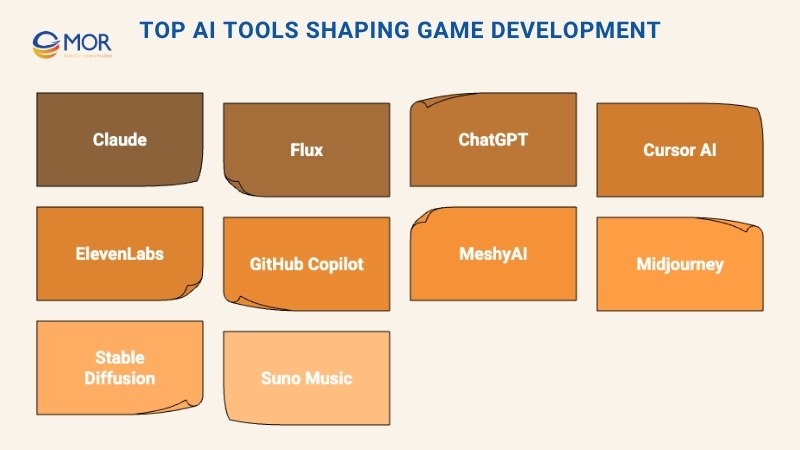
Top AI Tools Shaping Game Development
Claude
Claude is an advanced AI assistant that supports brainstorming, dialogue writing, and concept development. Writers use it to create more natural character conversations, refine storylines, and draft content that feels human and emotionally engaging. With its language understanding capabilities, it helps studios bring depth and consistency to interactive storytelling.
Flux
Flux simplifies the coding process through AI-based automation. It assists developers with debugging, writing cleaner code, and optimizing scripts for performance. Its real-time suggestions help reduce programming errors, allowing teams to focus on improving gameplay and technical efficiency. This makes it a valuable AI game coder for developers looking to work faster with greater accuracy.
ChatGPT
ChatGPT has become a creative partner for developers and designers. It assists with quest creation, dialogue writing, and procedural storytelling. Many studios rely on this tool to build branching narratives that adapt to player actions. It can also generate background lore or character backstories, making it one of the most versatile tools in AI in game development today.
Cursor AI
Cursor AI acts as a smart development assistant, helping engineers write optimized code while maintaining consistency across large projects. It analyzes patterns and offers context-aware suggestions to speed up production. For studios aiming to refine their technical workflow, Cursor AI provides practical support that keeps projects running smoothly.
ElevenLabs
ElevenLabs is one of the most popular voice generation tools used in modern artificial intelligence for games. It produces lifelike voiceovers for NPCs, narrations, or cinematic cutscenes without the need for long recording sessions. Its adaptive speech model allows characters to sound unique, expressive, and emotionally believable, improving overall immersion.
GitHub Copilot
GitHub Copilot works as an AI-powered programming companion that completes code in real time. It understands the logic behind each line, offering quick suggestions and debugging assistance. For teams managing large and complex projects, it provides the kind of precision that improves productivity and helps maintain high-quality standards throughout development.
MeshyAI
MeshyAI empowers artists to create detailed 3D assets in minutes. This AI game engine supports rapid prototyping by generating high-quality meshes, props, and textures from text prompts. It reduces repetitive modeling tasks, freeing designers to focus on creativity and artistic polish.
Midjourney
Midjourney is a favorite among concept artists and creative directors. It generates rich, stylized visual concepts that help teams explore different moods, environments, and character looks before committing to a final design. Many use it during early pre-production to visualize the game’s artistic direction quickly and cost-effectively.
Stable Diffusion
Stable Diffusion supports both 2D and 3D production needs. It creates textures, character art, and in-game assets with impressive visual quality. This AI for game dev platform is particularly valued for its ability to produce marketing visuals and UI elements that stay true to a project’s art style.
Suno Music
Suno Music helps developers craft original soundtracks using intelligent composition. It can produce ambient loops, battle themes, or emotional background scores that fit each moment in a game. The tool’s adaptive learning ensures that every track aligns with the tone and pace of the gameplay experience.
Together, these tools are redefining what’s possible in AI in game development. They make production faster, reduce manual workload, and inspire teams to push creative limits. As artificial intelligence continues to advance, these platforms, and the ones yet to come, will drive the next generation of smarter, more immersive games.
Case Studies And Examples Of AI In Game Development
While some innovations in AI in game development are still being tested, many developers and players have already started applying them in creative ways. These early projects show how artificial intelligence can reshape player experiences and expand what is possible inside virtual worlds.
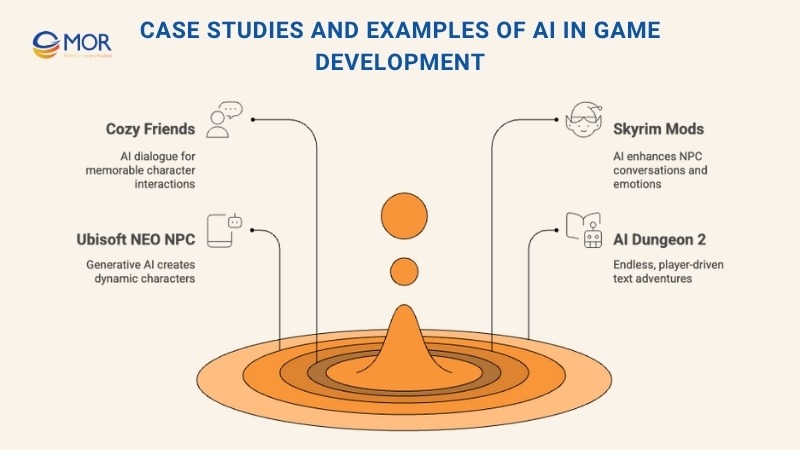
Case Studies And Examples Of AI In Game Development
Real-World Applications And Results
A great example is Campfire’s Cozy Friends, a heartwarming social game powered by AI-driven characters. Set in a peaceful virtual village, it features cute animal villagers that can talk, share stories, and even remember conversations. Built with large language models, these characters create natural interactions that make players feel like they are chatting with real friends.
Another impressive case comes from The Elder Scrolls V: Skyrim. Fans used modern AI in game development tools such as ChatGPT to redesign NPC dialogue systems. These modifications allow characters to hold dynamic conversations, recall past events, and react differently each time a player returns. Although the main plot stays the same, these AI-powered updates give the game a deeper sense of realism and emotional depth.
These examples highlight how AI technology in gaming is already changing the way players connect with virtual characters, turning familiar worlds into living, evolving spaces.
Innovative Uses of AI by Today’s Leading Game Studios
Major studios are investing heavily in AI in game development, experimenting with new ways to make games more interactive and emotionally engaging. At Ubisoft, the R&D team has introduced NEO NPC, a generative AI project designed to create characters that can hold real conversations with players. Each NPC is built on a detailed backstory written by the studio’s narrative team, which shapes how they speak, react, and express emotion. Although still in testing, Ubisoft plans to turn this into a flexible solution that can be integrated into both large and smaller titles.
Another major success story is Latitude’s AI Dungeon 2, a text-based adventure that showcases the power of AI in video game development for storytelling. Players type prompts, and the AI instantly generates endless, evolving storylines in response. The original version quickly attracted over 100,000 players within its first week of release. Building on that momentum, Latitude secured $3.3 million in funding in 2021 to continue improving the game’s AI-generated narratives. These innovations show how artificial intelligence in gaming is redefining creative freedom for both developers and players.
Key Challenges When Applying AI In Game Development
While AI in game development continues to expand creative possibilities, it also brings new challenges that require balance and ethical care. Developers must manage the technical demands of artificial intelligence while ensuring fairness, privacy, and player trust. Human oversight remains essential to prevent misuse and guide how AI systems behave inside virtual worlds.
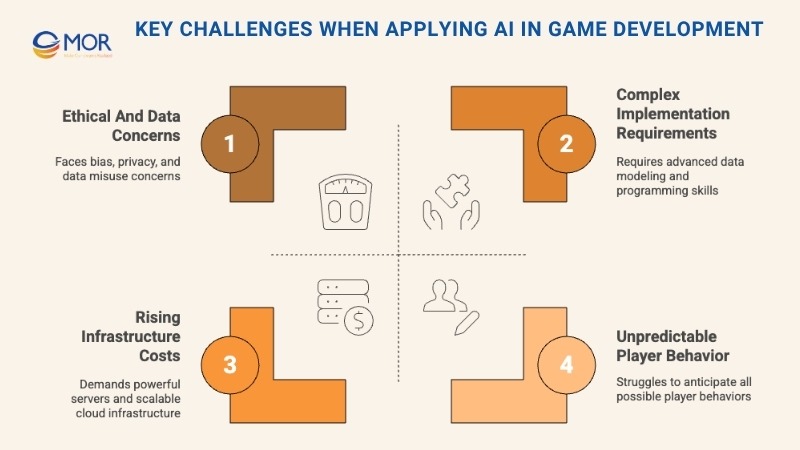
Key Challenges When Applying AI In Game Development
1. Complex Implementation Requirements
Building intelligent systems for games is not simple. Integrating AI in game development calls for advanced skills, large datasets, and detailed testing. Developers need to design and train models capable of interpreting unpredictable player behavior, managing dynamic environments, and generating procedural content in real time. Although these systems can reduce workload later, the early development phase often becomes longer and more demanding for teams.
2. Rising Infrastructure Costs
Developing AI in game development solutions requires strong computing power and access to scalable infrastructure. Training AI for graphics rendering, content generation, or player-adaptive mechanics depends heavily on cloud GPUs and high-performance servers. These needs can quickly increase expenses and technical complexity. The cost of data storage, model updates, and ongoing maintenance can also stretch project budgets, making it essential for studios to plan resource use carefully from the start.
3. Unpredictable Player Behavior
One of the biggest challenges in AI in game development is managing how players interact with complex systems. No matter how advanced an AI model is, it can never fully predict every possible action a player might take. This unpredictability sometimes causes bugs, logic errors, or strange reactions from NPCs, breaking immersion and gameplay balance. For example, players may find ways to confuse or trap AI-controlled characters in infinite loops, revealing weak points in the system’s decision-making logic. Preventing these issues often requires extensive testing, careful tuning, and ongoing updates.
4. Ethical And Data Concerns
As AI-powered game creation becomes more powerful, new ethical issues have started to surface. Some algorithms may unintentionally reflect biases from their training data, creating unbalanced gameplay or reinforcing stereotypes. Privacy risks also emerge when games analyze player data to improve personalization. These problems can be hard to detect because they are deeply embedded in the AI’s structure. A recent industry survey found that over 80% of developers worry about the responsible use of generative AI. This shows that while AI offers exciting opportunities, it also demands careful human supervision and transparent design practices to maintain fairness and trust.
The Future Of AI In Game Development
The influence of AI in game development is growing rapidly, reshaping how games are created, played, and experienced. It affects every stage of production, from design and coding to storytelling and interaction. The next generation of games will likely feature deeper personalization, adaptive environments, and levels of realism that blur the line between digital and real life.
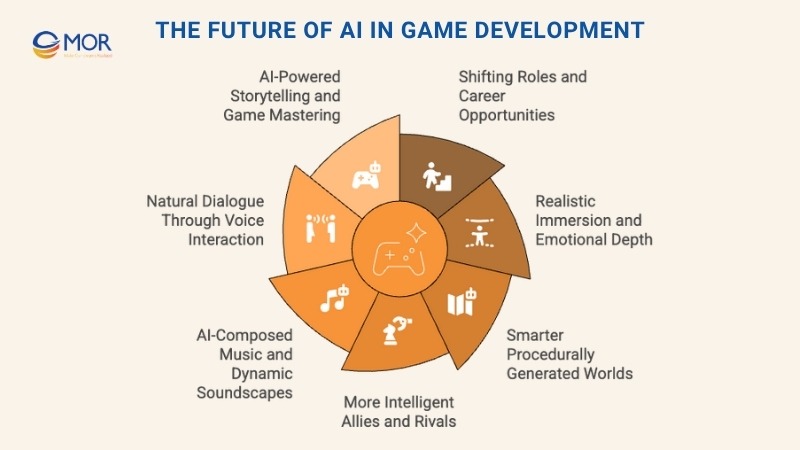
The Future Of AI In Game Development
Shifting Roles And Career Opportunities
The rise of AI in game development will transform many jobs within the industry. Some positions may evolve or disappear, but new roles will emerge as studios adopt intelligent tools and automation. Developers who learn to work with AI systems will have a clear advantage, as skills in training models, managing data, or fine-tuning AI for game dev will become highly valuable. The professionals who embrace these changes will lead the way in designing smarter, more immersive gaming experiences.
Realistic Immersion And Emotional Depth
AI will continue to make games feel more authentic and emotionally engaging. It’s no longer just about improving visuals, but about shaping believable behavior and reactions. Future NPCs will express emotions such as fear, curiosity, or frustration based on player actions, creating more natural interactions. With AI in game development, virtual worlds will respond intelligently to movement, sound, and decision-making, turning static settings into living, reactive environments that feel truly alive.
Smarter, Procedurally Generated Worlds
Procedural generation has long been part of gaming, but with this approach, it’s evolving into something far more intelligent. Instead of random maps or repetitive designs, AI can shape worlds that adapt to each player’s behavior. A city might grow around your stealth-based decisions, or missions could adjust based on past actions. These dynamic systems make every playthrough feel personal, as if the game world truly remembers and reacts to you. Replayability becomes richer and more meaningful, turning exploration into an ongoing dialogue between player and machine.
More Intelligent Allies And Rivals
Future companions and enemies will act less like pre-programmed bots and more like real teammates or challengers. Through AI in game development, characters can analyze your playstyle, anticipate moves, and respond strategically in combat. Allies will coordinate attacks or defend you based on context, while enemies will learn from your habits to create tougher, smarter encounters. This new level of awareness makes every battle feel unpredictable, adding both tension and excitement to each fight.
AI-Composed Music And Dynamic Soundscapes
The next big leap in AI in game development is happening in sound. Instead of using static soundtracks, AI can now compose music that changes with emotion and action. During a tense boss battle, the rhythm intensifies, while calm exploration brings softer ambient tones. This dynamic audio adjusts in real time, creating a soundtrack that reacts as naturally as the visuals. It gives every moment more depth and makes players feel truly part of the scene.
Natural Dialogue Through Voice Interaction
Future games will move beyond menu-based dialogue systems. With AI in game development, players will be able to speak directly to NPCs and receive unique, unscripted responses. Conversations will flow more like real interactions, where tone and choice matter. This kind of voice-controlled engagement opens a new layer of storytelling, allowing players to shape narratives in spontaneous and personal ways.
AI-Powered Storytelling And Game Mastering
In the world of role-playing games, AI is ready to take on the role of storyteller. Acting as a digital game master, it can create quests, manage characters, and adapt plots instantly based on player decisions. The system keeps adventures alive and flexible, especially for groups without a human Dungeon Master. With AI technology in gaming, this kind of intelligent storytelling brings endless creativity to RPGs, making every session feel like a unique, shared story.
How To Get Started With AI In Game Development
Entering the world of AI in game development requires a mix of technical skills, creativity, and practical experience. While formal education can help, many professionals also learn through hands-on projects, online training, or self-study. Because game creation involves programming, animation, storytelling, and design, there are multiple ways to begin your journey. Below are some simple steps to help you build a strong foundation.
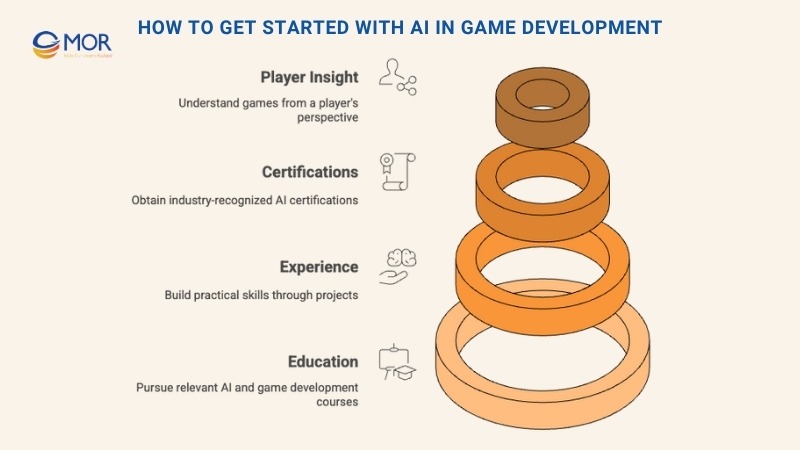
How To Get Started With AI In Game Development
Pursue Relevant Education
For beginners, earning a degree in game development, computer science, or software engineering is a strong starting point. These programs teach essential skills like coding, algorithms, and digital design. Those with creative backgrounds in animation or interactive media can also transition into AI in game development, as their artistic knowledge adds value to storytelling and world-building.
Developers who already have experience in the field might consider advancing their studies with a master’s program focused on artificial intelligence. Options such as software engineering with an AI concentration help learners understand how to use AI in game development more effectively, preparing them for future roles in this fast-growing industry.
Build Real Experience
In AI in game development, practical experience matters as much as formal education. Employers want to see what you can actually create, not just what you know in theory. Start by working on small projects, experimenting with AI features, or developing simple games that show your creativity and problem-solving ability.
A strong portfolio can open many doors, especially at indie studios that value flexibility and innovation. Self-taught developers often stand out when they can demonstrate real results. Look for internships or entry-level positions to gain professional exposure, learn from experienced teams, and understand how this technology is applied in real production environments.
Gain Industry Certifications
If you want to grow your career in AI in game development, earning recognized certifications is a great way to prove your expertise. These credentials show that you understand both game creation and AI technology, which makes you more competitive in the job market. Some valuable options include:
- IBM AI Developer Professional Certificate – a solid foundation in applied AI and development.
- Google Cloud’s Introduction to Generative AI Learning Path – focused on modern AI models and real-world applications.
- NVIDIA AI LLMs Certification – designed for developers working with deep learning and advanced AI systems.
Understand Games As A Player
To succeed in this field, you also need to think like a gamer. Playing a wide variety of games helps you study what engages players and what doesn’t. It builds your creative sense and gives you practical insight into how different mechanics, visuals, and stories come together. A strong understanding of gameplay from the player’s point of view will make your AI in game development projects more engaging and authentic.
Accelerate Your AI In Game Development Projects With MOR Software
At MOR Software, we help studios and enterprises accelerate their AI in game development projects with end-to-end technical expertise. Our team combines machine learning, natural language processing, and reinforcement learning to build smarter, more adaptive games that respond to every player’s action. From early concept design to deployment and QA, we manage the full development cycle to bring your creative vision to life.
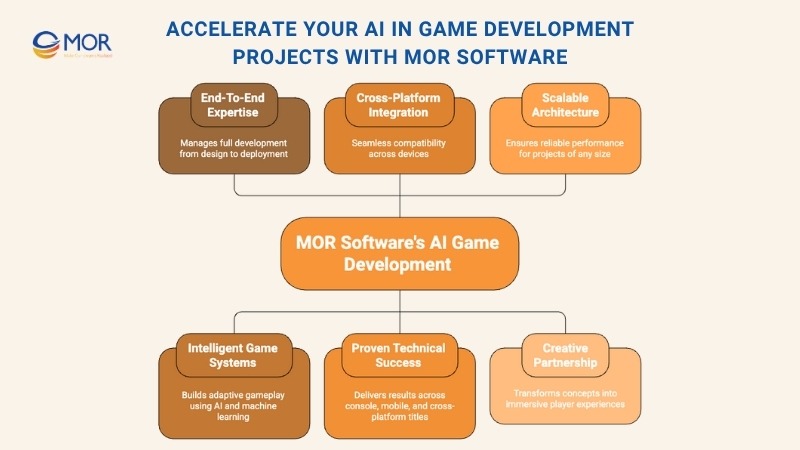
Accelerate Your AI In Game Development Projects With MOR Software
We specialize in crafting interactive environments, intelligent NPC systems, and predictive player analytics that enhance engagement and replay value. Whether you need AI integration for mobile, console, or cross-platform titles, our engineers apply the right technology stack to meet your goals. With proven success in large-scale software and mobile solutions, MOR Software delivers reliable performance, scalable architecture, and cost-effective development. Partner with us to turn your game ideas into intelligent, immersive experiences that keep players coming back. Contact us to get started.
Conclusion
AI in game development is not just a trend but the next evolution of interactive entertainment. It empowers creators to design smarter worlds, deeper narratives, and more dynamic gameplay. With MOR Software, you can harness this potential to build immersive, intelligent, and scalable games tailored to your audience. Our expertise ensures innovation without limits. Ready to bring your next AI-powered game to life? Contact MOR Software today to get started.
MOR SOFTWARE
Frequently Asked Questions (FAQs)
Can AI be used in game development?
Yes. Artificial intelligence is widely used to design smarter characters, generate dynamic worlds, and automate repetitive tasks. It helps developers build immersive gameplay while saving both time and production costs.
Do most video game developers use AI agents?
According to recent research, nearly 90% of game studios now integrate AI agents into their workflows to automate testing, content creation, and behavior modeling. It’s become a core part of modern game pipelines.
Is GTA 6 using AI technology?
Yes. GTA 6 is reported to leverage AI for lifelike NPCs, real-time world generation, and adaptive storytelling. These features create a more realistic and responsive open-world experience.
Will AI replace game developers?
No. AI assists developers rather than replaces them. It handles technical or repetitive work, giving creators more time to focus on design, storytelling, and innovation.
Can ChatGPT or similar tools build a game?
Tools like ChatGPT can generate dialogue, design ideas, and basic code snippets, but they can’t create a full game independently. Human guidance and creativity are still essential.
Can AI create a complete game from scratch?
AI can produce playable prototypes and assets, but full-scale games still need human input for direction, artistic vision, and quality control. Current tools like Rosebud or GPT-based systems focus on assisting developers.
How is AI changing the role of NPCs in games?
AI gives NPCs memory, emotions, and learning ability. Instead of scripted responses, they adapt to player actions, making interactions more natural and unpredictable.
What are the biggest advantages of using AI in game development?
AI speeds up production, enhances realism, improves testing accuracy, and personalizes player experiences. It also helps small teams create large-scale worlds efficiently.
Which AI technologies are most used in game creation?
Commonly used technologies include machine learning, reinforcement learning, natural language processing, and procedural content generation. These systems drive everything from adaptive difficulty to environment design.
How will AI shape the future of gaming?
AI will continue to make games more responsive, emotional, and player-driven. Expect smarter characters, evolving worlds, and storylines that adapt uniquely to every player’s decisions.
Rate this article
0
over 5.0 based on 0 reviews
Your rating on this news:
Name
*Email
*Write your comment
*Send your comment
1